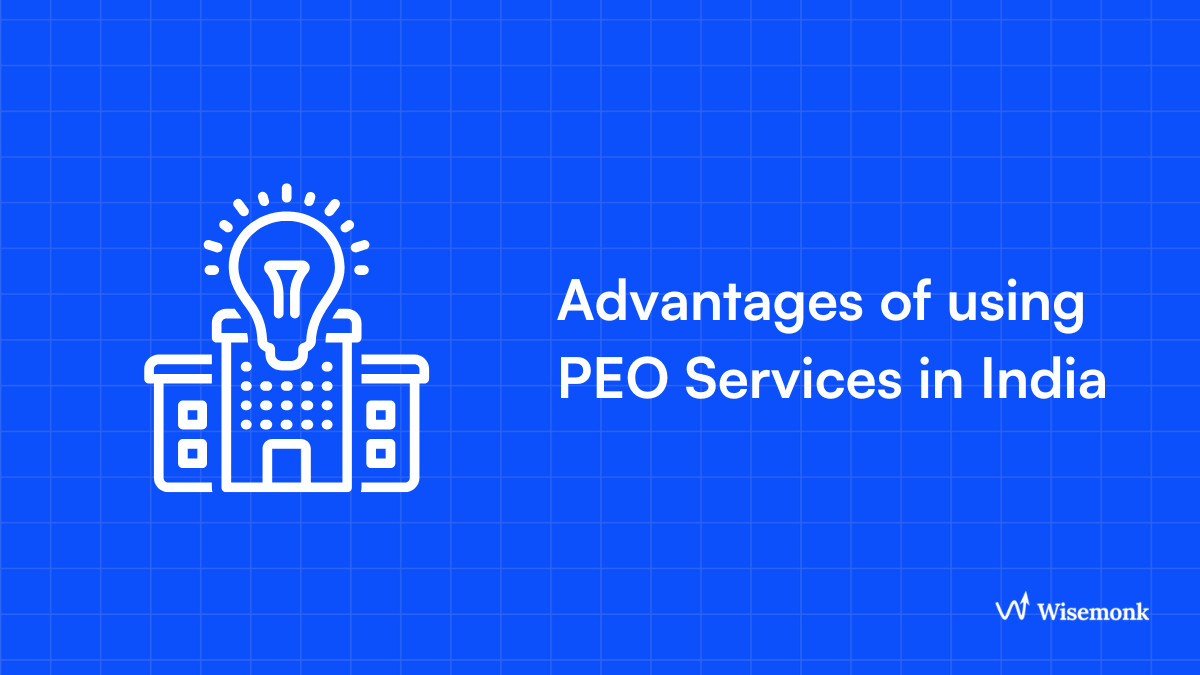Looking for the best place to hire in Latin America? Mexico stands out for global employers thanks to its growing economy, skilled workforce, and competitive minimum wage. Recent labor reforms (2019–2023) have modernized employment relationships and raised compliance standards under Mexican labor laws. For companies aiming for efficient and compliant hiring, an Employer of Record in Mexico offers a reliable route to manage payroll, local laws, and quick market entry. Now, let’s dive into Mexico’s legal employer framework and how it shapes every employment relationship.
What is the Mexican Federal Labor Law (LFT) and Why Does it Matter?[toc=Mexican Federal Labor Law]
Before hiring employees in Mexico, understanding the federal labor law is important. The Federal Labor Law (Ley Federal del Trabajo, or LFT) sets the baseline for all employment contracts, employer costs, and workers' rights. Based on our extensive research, here are the core components you need to know:
- The LFT mandates an employment relationship for any employment contracts executed in the country.
- Mexican labor laws provide robust statutory benefits, including minimum wage, severance pay regulations, and twelve general public holidays.
- Recent labor reforms (2019-2023) tightened contractor compliance and redefined core activities versus specialized services.
- Union rights and collective bargaining have become more transparent, requiring all collective bargaining agreements to be publicly available and subject to employee approval.
- Subcontracting regulations have evolved: routine business activities can no longer be outsourced to avoid legal employer obligations.
With this strong legal foundation in place, businesses can make informed decisions and avoid compliance risks when establishing an employment relationship in Mexico.
What are the Key Benefits of EOR in Mexico?[toc= Key Benefits of EOR]
If you’re considering entry into the Mexican market, the EOR model offers more than administrative convenience. The standout advantages are:
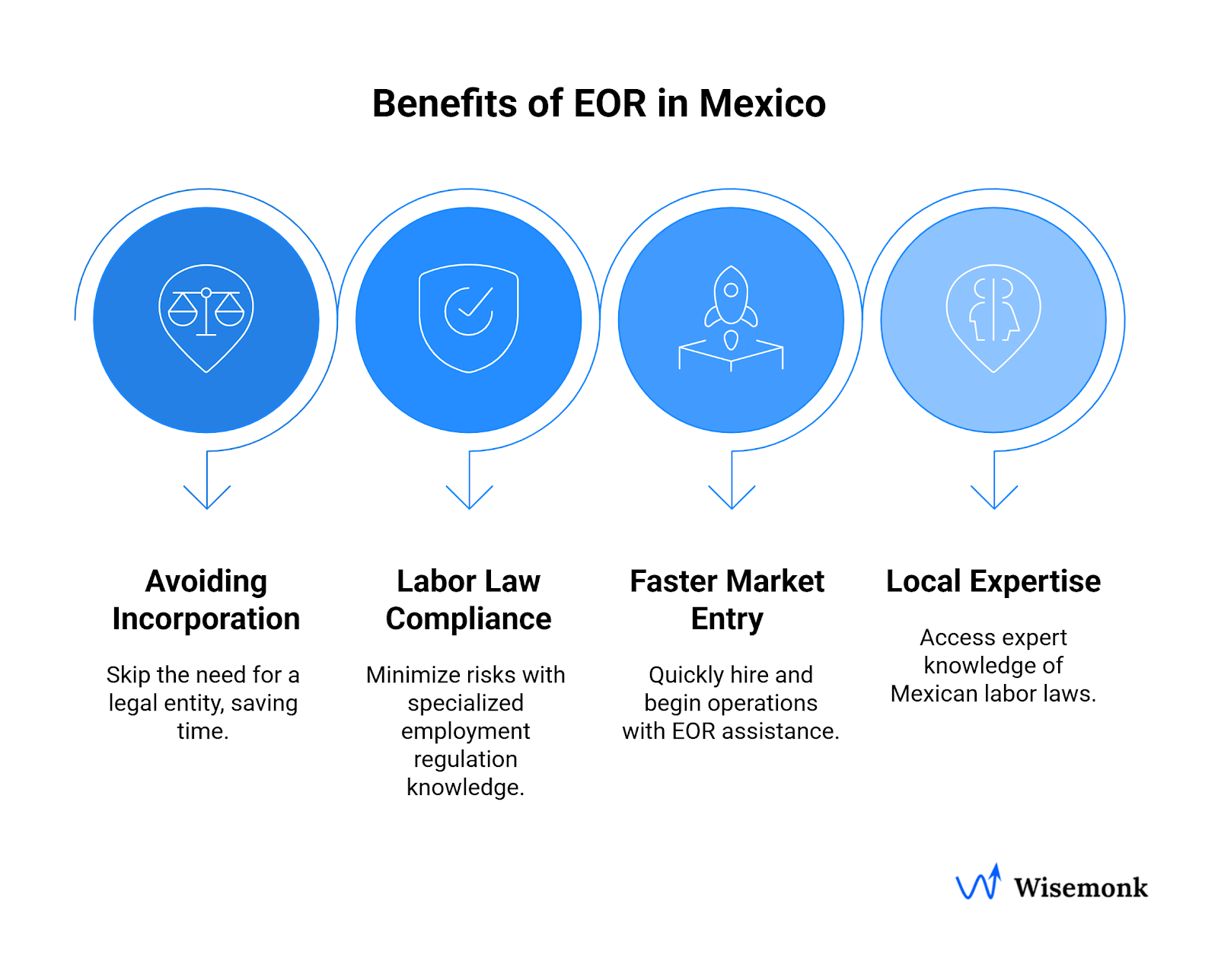
- Avoiding Complex Incorporation: Eliminate the need for your own legal entity and local entity, saving months on setup and compliance.
- Labor Law Compliance Assurance: EORs specialize in federal, state, and local employment regulations, minimizing compliance risks and penalties.
- Faster Market Entry: Rapidly hire employees and start operations while your EOR partner handles employment contracts and payroll taxes.
- Local Expertise and Support: Tap into expert knowledge about Mexican labor laws, statutory benefits, and global payroll Mexico requirements to maintain smooth operations.
Having seen these benefits firsthand for companies ranging from startups to multinationals, we can attest that a trusted EOR in Mexico acts as your employment partner for compliant, efficient scaling.
Mexico-Specific Employment Requirements: What Employee Rights Are Unique in Mexico?[toc=Employment Requirements]
Next, let's explore the unique employment requirements that every business must understand in Mexico. For anyone managing employees in Mexico, the legal requirements go beyond global payroll or standard employment contracts. Here’s what stands out:
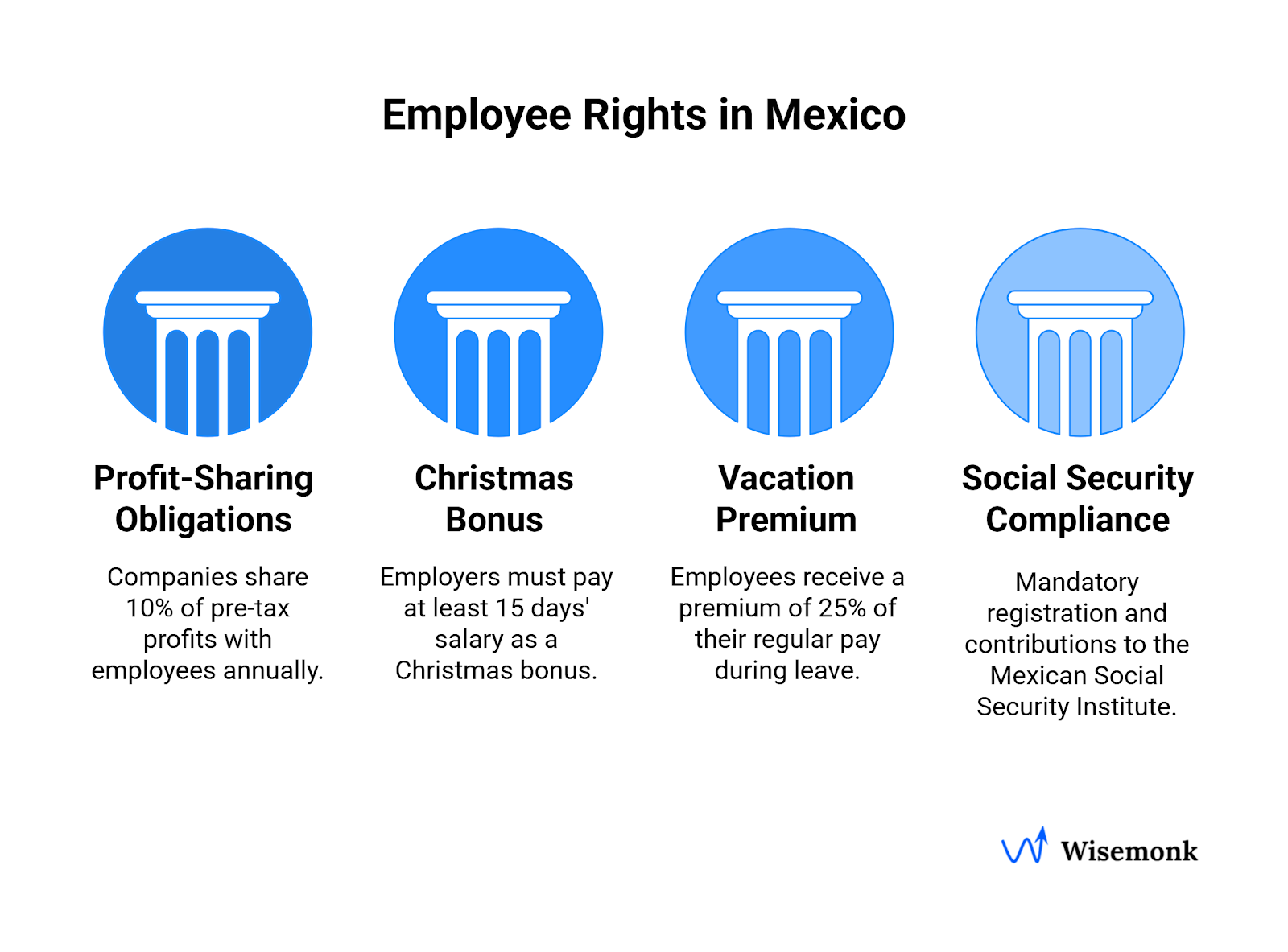
- Profit-Sharing Obligations (PTU): Companies must share 10% of pre-tax profits with all the employees each year (STPS - PTU Guide).
- Christmas Bonus (Aguinaldo): Employers must pay at least 15 days’ salary as a Christmas bonus by December 20.
- Vacation Premium Requirements: Employees receive a vacation premium of at least 25% of their regular pay during leave.
- Social Security (IMSS) Compliance: Registration and contributions to the Mexican Social Security Institute are mandatory for all Mexican employees.(IMSS)
Recognizing these requirements is fundamental to providing competitive benefits and building trust with your Mexican workforce.
Payroll and Tax Compliance: How Do Employers Navigate Mexican Payroll and Taxes?[toc=Payoll & Tax Compliance]
Dealing with payroll management and the tax administration service in Mexico can be overwhelming, especially for a foreign country entrant. Here’s a practical breakdown for compliant operations:
- Federal Tax Obligations: Companies must withhold and remit income tax (ISR), social security, and payroll taxes through the Tax Administration Service (SAT)
- State and Local Taxes: Each state in Mexico may have its own applicable taxes and employment regulations. consult your EOR to ensure labor law compliance.
- Monthly and Annual Filings: Employers file monthly tax withholdings, IMSS reports, and annual declarations with the local tax authorities and SAT(SAT).
- Audit Preparation and Support: Professional employer organizations and EOR service partners assist with documentation to withstand government audits and inspections.
With the right payroll management processes, you minimize compliance risks and keep operations running smoothly.
Employee Benefits and Entitlements: What Mandatory Benefits Support Your Mexican Team?[toc=Employee Benefits]
When operating in Mexico, providing competitive and legally compliant benefits is not optional. Here are the mandatory benefits to offer your Mexican team:
- Health Insurance (IMSS): All employees must be enrolled in the Mexican Social Security Institute, which covers health, disability insurance, and sick leave (IMSS official site).
- Housing Fund (INFONAVIT): Employers must contribute to the national housing fund, allowing employees in Mexico to access affordable housing.
- Retirement Savings (AFORE): Employers contribute to employee-managed retirement savings accounts as part of statutory benefits.
- Other Required Benefits: Cash benefits include vacation premium, Christmas bonus, eight paid public holidays, maternity leave, and paternity leave.
Providing these benefits isn’t just about compliance; it’s essential for retaining top talent in Mexico’s competitive market.
What is the Step-by-Step Hiring Process via EOR in Mexico?[toc=Step-by-Step Hiring Process]
Starting your Mexico operations? The hiring process, in our experience, is structured and swift when facilitated by a reliable EOR. Let’s now walk through the steps involved in hiring and onboarding employees in Mexico, especially if you’re engaging an employer of record service. Here’s a quick roadmap:
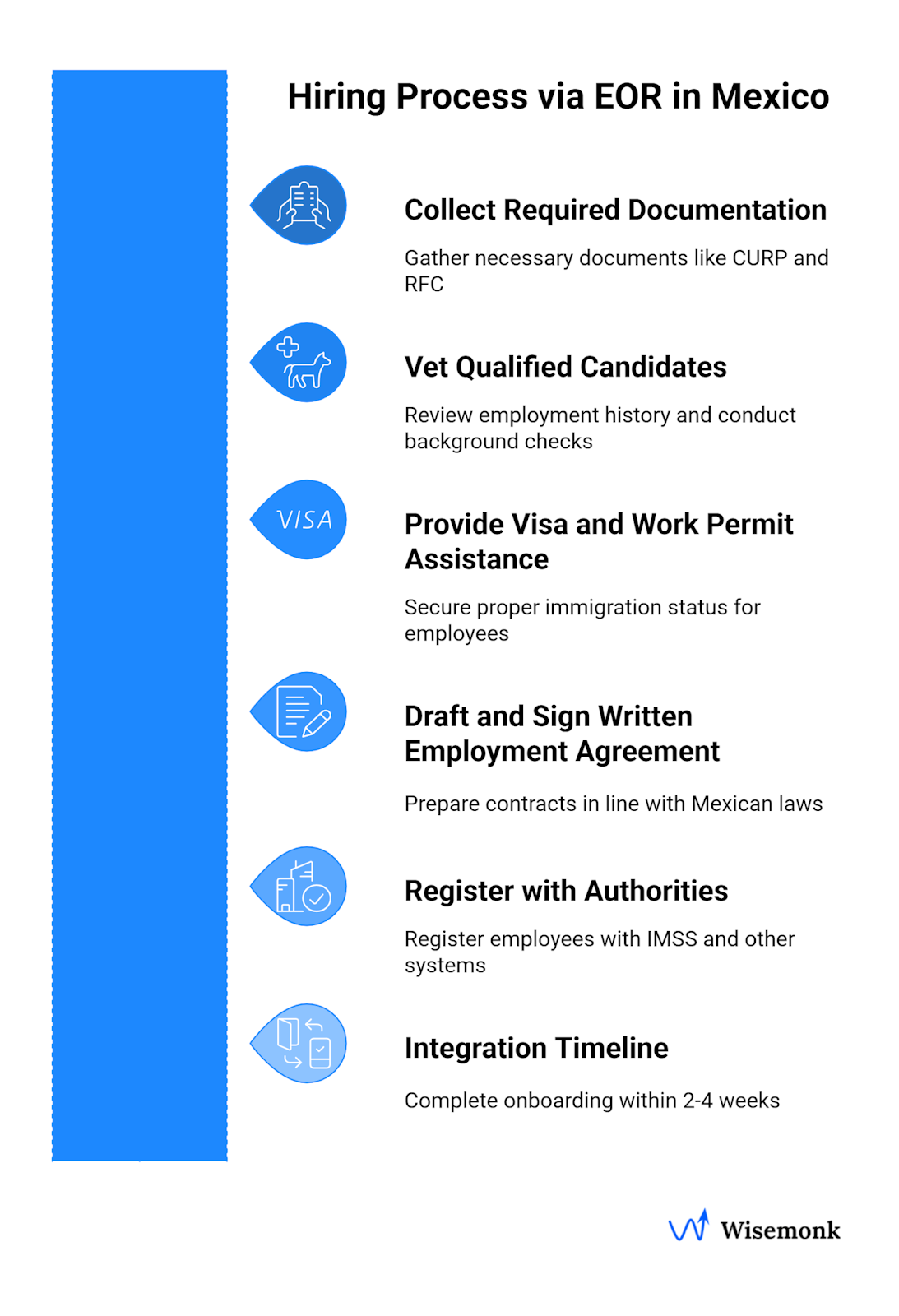
1. Collect Required Documentation
- CURP (Unique Population Registry Code)
- RFC (Tax Identification Number, SAT - RFC guide)
- Proof of address and identification
2. Vet Qualified Candidates
- Review employment history, qualifications, and conduct background verification
3. Provide Visa and Work Permit Assistance
- Secure proper immigration status for foreign employees or international employees
4. Draft and Sign Written Employment Agreement
- EOR prepares contracts in line with Mexican employment laws and labor law regulations
5. Register with Authorities
- EOR registers employees with IMSS and other mandatory social security systems
6. Integration Timeline
- Standard onboarding via EOR takes 2-4 weeks, enabling you to pay employees compliantly
Having a structured process ensures you can pay employees promptly and meet all regulatory standards from the start.
Managing Mexican Workforce: What Are the Keys to Effective Workforce Management?[toc=Workforce Management]
From a local employment regulations perspective, effective management goes well beyond payroll:
- Cultural Considerations: Respect hierarchical business structures, value personal relationships, and recognize work-life balance needs.
- Communication Best Practices: Clear communication with employees in Mexico, often in Spanish, is critical; regular updates help maintain smooth operations.
- Performance Management Strategies: Frequent feedback, transparent goals, and fair recognition of achievements encourage loyalty and performance.
- Remote Work Policies: The Mexican government has set standards for telework, requiring written employment agreements and stipulating resources for remote workers (STPS Telework Regulation).
Navigating these management essentials sets the stage for mastering new laws governing subcontracting and compliance.
What Are Mexico’s New Subcontracting Rules and How Do You Stay Compliant?[toc=Subcontracting Rules]
After broad reforms, subcontracting (outsourcing) underwent radical change in Mexico. Here are the new Subcontracting rules:
- New Subcontracting Regulations: Core activities of the business structure cannot be outsourced. Only specialized services, those unrelated to your primary business, are eligible.
- Specialized Services vs. Core Activities: For example, a food company can’t outsource cooks but can contract a cleaning company for janitorial services.
- Compliance Strategies: All contracts for specialized services must be registered with the Ministry of Labor (STPS) and comply with strict reporting requirements.
- Risk Mitigation Approaches: Use an EOR in Mexico as your employment partner to assume the role of legal employer, protect your business against compliance risks, and ensure local employment regulations are met.
Compliance in this area is non-negotiable and demands proactive management.
How Much Does It Cost to Hire with an EOR in Mexico and What ROI Can You Expect?[toc=Cost Analysis & ROI]
Budget planning and transparent fee structures are crucial when weighing EOR services Mexico versus building your own legal entity.
Based on industry reports:
- EOR service fee structures are clear and cover statutory benefits, filing payroll taxes, and compliance services.
- Potential hidden costs in Mexican employment, such as severance pay, income tax withholding errors, or penalties from non-compliance, are minimized through EOR oversight.
- Return on investment (ROI) is measured by speed to hire, compliance risk reduction, and lowered employer costs, allowing more budget for employees' salary and competitive benefits packages.
Now, let's summarize the strategic takeaways and next steps.
Conclusion
After working with a diverse range of global employment clients, our strategic recommendations for any company considering expansion are:
- Assess EOR vs. Own Legal Entity: Evaluate your business structure and growth plans against the compliance risks and employer costs in Mexico.
- Prioritize Compliance and Local Expertise: Partner with recognized employer of record EOR providers for all professional services.
- Implement Structured Reporting and Audit Readiness: Maintain thorough records and clear documentation to adapt to evolving Mexican employment laws.
Implementation Roadmap:
- Define your core and specialized activities
- Choose a reputable EOR services Mexico partner
- Align your written employment agreements and benefits packages to Mexican labor laws
- Set up streamlined payroll management and reporting processes
With these steps, you’ll be well-equipped to build a successful workforce in Mexico while maintaining smooth operations and full legal compliance.
Ready to expand your global business quickly and compliantly? Partner with Wisemonk’s Employer of Record services to effortlessly manage hiring, payroll, and compliance, so you can focus on growing your business with confidence.
Frequently asked questions
What are the recent changes in Mexican labor law?
Since 2019, reforms have targeted collective bargaining, increased transparency in union activities, stricter regulations on subcontracting, and greater enforcement of statutory benefits such as minimum wage and severance pay.
How does profit-sharing work for employees?
Employers must annually distribute 10% of pre-tax profits among all eligible employees, calculated based on a combination of days worked and the employee's salary (STPS PTU).
What are the subcontracting restrictions?
Under new Mexican laws, only specialized services unrelated to the company’s core activity can be subcontracted, and every agreement must be registered and strictly documented with the Ministry of Labor.
How long does it take to hire through EOR in Mexico?
Typically, an EOR can onboard new employees in 2-4 weeks, provided all documents are ready and background verification is rapid.
What happens during employee termination?
Employers must follow strict procedures for dismissal, including paying severance, documenting reasons, and reporting to both the Tax Administration Service (SAT) and IMSS.
What is an Employer of Record (EOR) agreement?
An EOR agreement is a legal contract between a company and an EOR, outlining responsibilities for payroll, taxes, compliance, benefits, and employment management.
What are the cons of a PEO?
Common drawbacks of a PEO include higher costs, less direct control over HR processes, and potential limitations in international coverage depending on the provider.
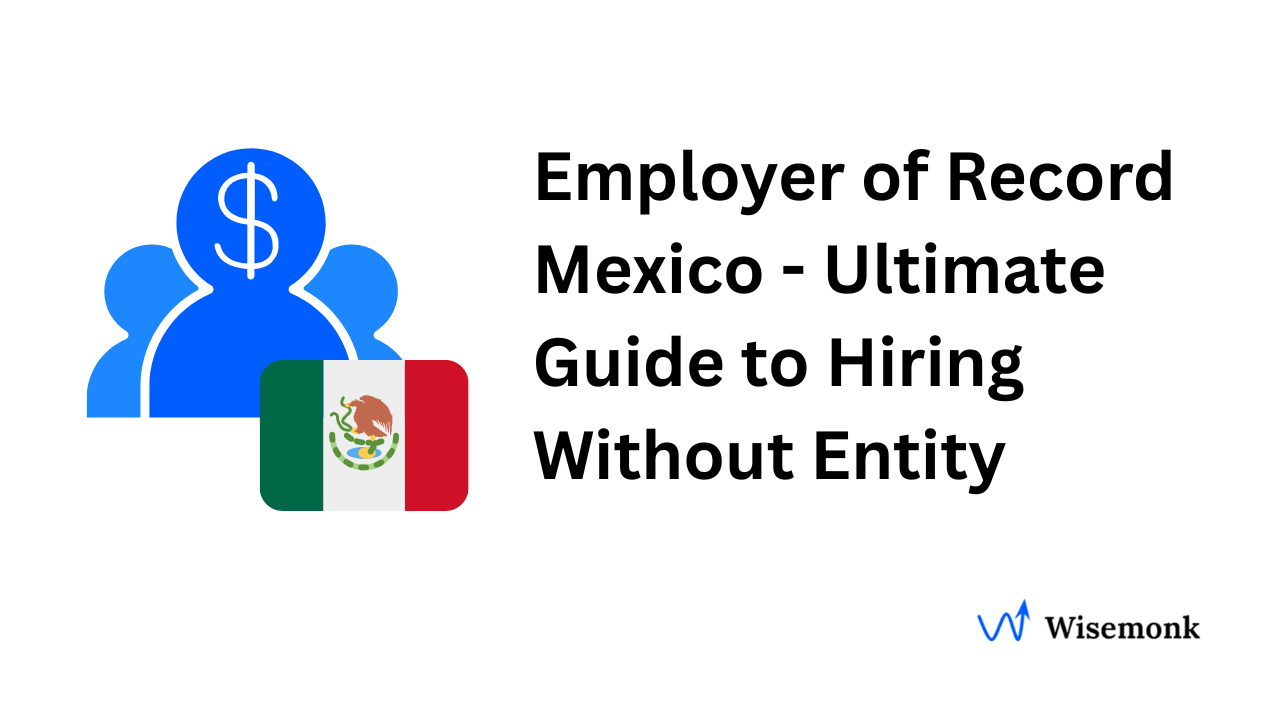

.png)
